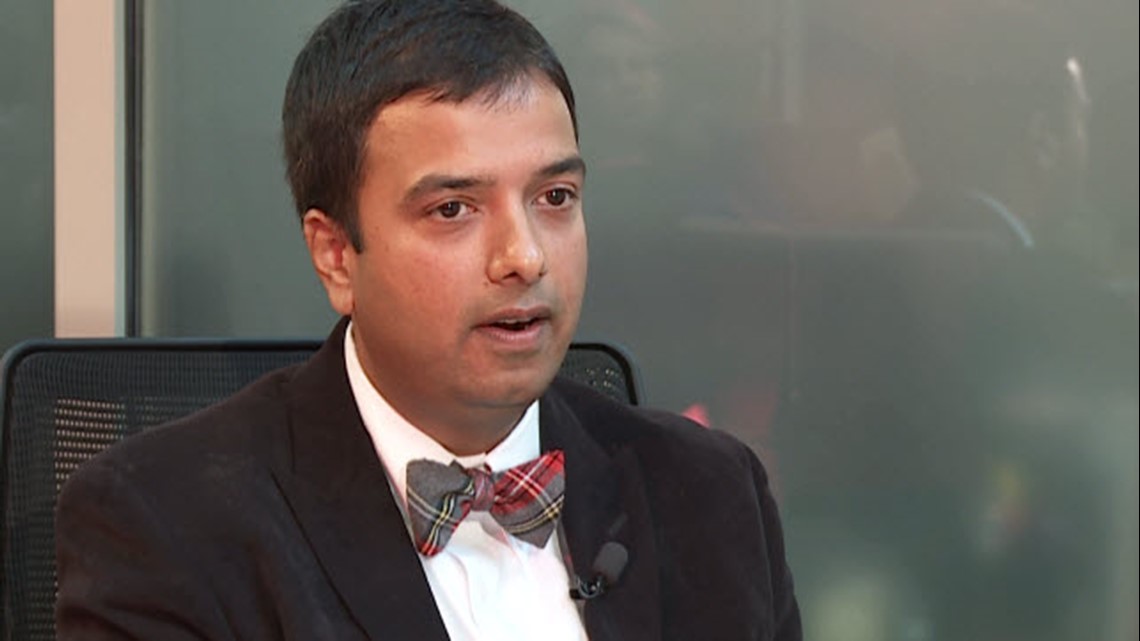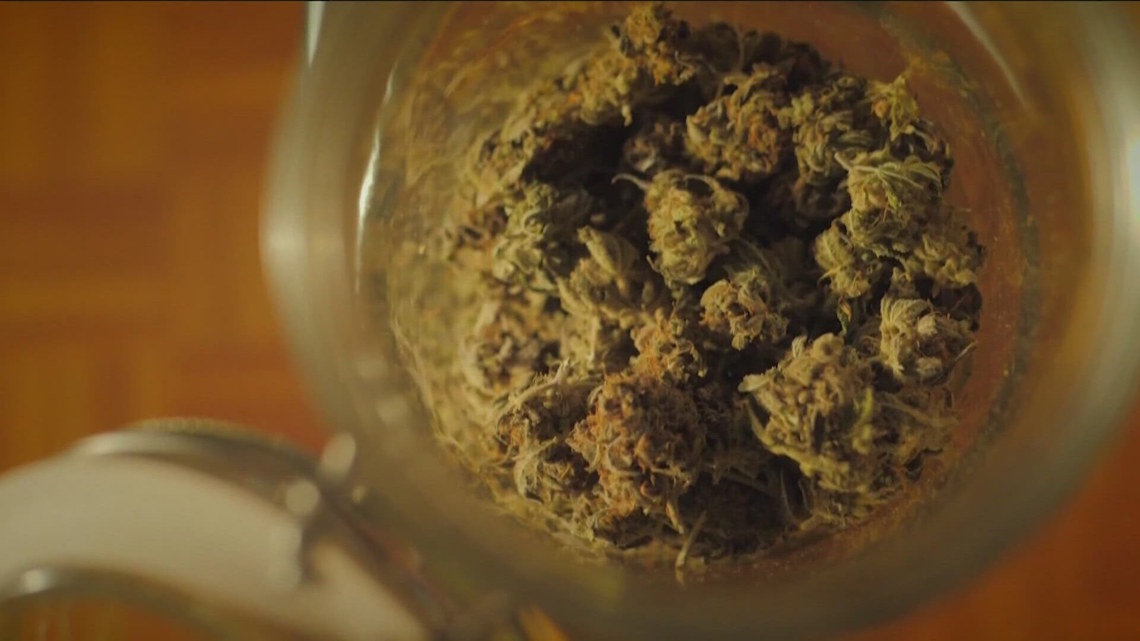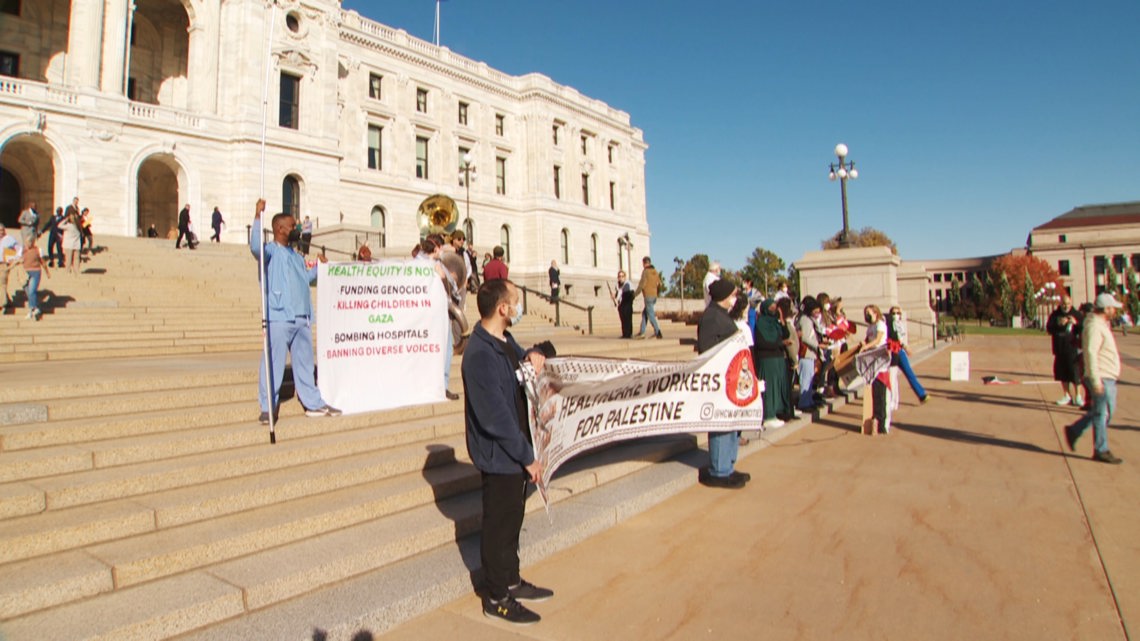Kare11
State’s hospitals in a financial ‘crisis’


A new report from the Minnesota Hospital Association reveals hundreds of millions of dollars in operating losses so far in 2023.
MINNEAPOLIS — The Minnesota Hospital Association (MHA) painted a bleak financial picture of the state’s healthcare industry on Monday, with the release of a new report citing hundreds of millions of dollars in operating losses so far in 2023.
The MHA did not publish the full report, nor did it cite any specific hospital or healthcare systems. However, the group released highlights of a survey of more than 70 members — representing facilities of all sizes in all areas of the state — showing more than $400 million in losses through the first six months of the year. According to Dr. Rahul Koranne, the CEO and President of MHA, these losses are more than double the figures reported during the same time period in 2022. Already this year, Fairview and Allina have both announced layoffs of hundreds of employees.
Overall, two out of three hospitals included in the survey reported losing money.
“This is a pretty grave state and, I would say, quite a crisis,” Koranne said. “Our not-for-profit hospitals and health care systems are hanging dangerously from this cliff and they’re getting tired.”
Koranne blamed part of the problem on the federal programs Medicare and Medicaid, which offer lower reimbursement rates to hospitals compared to private insurers. According to the MHA report, the proportion of patients in Minnesota using these two programs has jumped from 62 to 64%. In some facilities, Koranne said, nearly three-quarters of patients are on Medicare or Medicaid, leading to more than $2 billion in underpayment in Minnesota.
“Those reimbursements, or payments, are fixed. So, we can’t raise prices. These two programs are paying significantly below the cost of providing care to our patients,” Koranne said. “So, if you have 70 percent of your patients covered by these governmental programs, we can’t raise prices and they’re paying you below the cost of care. That’s what causes [the problem].”
The hospital association also cited a 6% increase in the cost of supplies, and a 7% increase in the cost of labor.
Mary Turner, the president of the Minnesota Nurses Association, challenged some of the findings in the MHA report as they related to labor costs. Last year, during the latest round of contract negotiations, she fought for an 18% raise over three years for nurses in the Twin Cities.
“You can’t run a good business without spending the money on enough staff to take care of patients properly,” Turner said. “I would remind people that we haven’t had anything near what the cost of living is for over a decade. And so a lot of that was just making up for lost time.”
Dr. Koranne, meanwhile, identified workforce staffing as a significant challenge. He called on the state legislature to address the needs of workers and hospitals in the upcoming legislative session. (Last spring, hospital executives and labor leaders clashed over the best course of action to tackle the workforce shortage, leading to a narrower form of legislation than originally proposed by DFL lawmakers.)
“We need to really resource it in this upcoming session and many sessions to come, so that we can have workers and staff we need,” Koranne said. “If we don’t have the money, and if don’t have the workers, we will not be providing care and that would be sad.”
Watch the latest local news from the Twin Cities and across Minnesota in our YouTube playlist:
WATCH MORE ON KARE 11+
Download the free KARE 11+ app for Roku, Fire TV, Apple TV and other smart TV platforms to watch more from KARE 11 anytime! The KARE 11+ app includes live streams of all of KARE 11’s newscasts. You’ll also find on-demand replays of newscasts; the latest from KARE 11 Investigates, Breaking the News and the Land of 10,000 Stories; exclusive programs like Verify and HeartThreads; and Minnesota sports talk from our partners at Locked On Minnesota.
Kare11
‘This doesn’t change anything’ Biden apology for Native American boarding schools draws mixed reaction


For the very first time, a sitting President has apologized for boarding schools that tore Native Americans apart and led to countless cases of abuse and death.
MINNEAPOLIS — During his first presidential visit to Indian Country on Friday, Joe Biden delivered a historic and emphatic apology, acknowledging 150 years of abuse, trauma and death inflicted by Native American boarding schools.
“I formally apologize, as President of the United States of America, for what we did,” Biden said. “It’s one of the most horrific chapters in American history,” said President Biden.
Christine Diindiisi McCleave, former CEO of the National Native American Boarding School Healing Coalition, spent years documenting the stories of boarding school survivors and advocating for justice and accountability by the US leaders.
“My family has two generations of boarding school history that I know of,” McCleave said, during an interview for the KARE 11 Series “Lost History,” which detailed the impact of boarding schools in Minnesota.
During his speech on Friday, President Biden acknowledged the work of the Native American Boarding School Healing Coalition and efforts to better understand the horrors and generational trauma the schools inflicted.
“Generations of Native children stolen, taken away to places they didn’t know,” Biden said. “Children abused emotionally, physically and sexually abused, forced into hard labor, some put up for adoption without the consent of their birth parents. Some left for dead in unmarked graves.”
Christine Diindiisi McCleave: “I struggle with what I’m supposed to say and what I really feel.”
Kent Erdahl: “Why do you say that?”
McCleave: “Well, because today is historic and while I am grateful to see this progress being made. I am also realizing just how short it falls… from real reparations, from real healing.”
She knows she’s not the only one who feels that way. The National Native American Boarding School Healing Coalition surveyed survivors in 2016.
“The thing they wanted the least was an apology because, while it is an acknowledgement, it doesn’t change anything,” McCleave said. “The majority of them said they wanted a truth commission. Trying to find out exactly how many boarding schools existed, how many children went to those boarding schools and how many children died at those schools.”
She says an investigation led by Interior Secretary Deb Haaland, whose grandparents and mother were among those sent to these schools did help better understand that impact, but it only scratched the surface.
“They were only able to investigate the Federal Government’s records,” McCleave said. “Half of these schools were run by churches, of various denominations, and so a truth commission would be able to look into those records as well.”
“Nearly one thousand documented Native child deaths, though the real number is likely to be much, much higher,” Biden said on Friday.
Bills in both the House and the Senate could make that commission a reality, but until that happens, Christine says she can’t ignore the politics of an apology that took place in a swing state, just days before an election.
McCleave: “This apology doesn’t change anything for my mother, who was abused as a child. Of for my grandfather who was a abused at a Catholic Indian Boarding School.”
Erdahl: “Do you hope that this isn’t just an election ploy?”
McCleave: “I hope that this apology actually helps that bill get passed. Native American people are no stranger to being political pawns, so you know what, if this is an election ploy so be it, I hope something good comes out of it.”
Kare11
Hazelden addiction, recovery experts host first cannabis summit


Researchers spoke about increased THC potency and the impact on youth brain development.
ST PAUL, Minn. — Whether purchased from dealer or dispensary, weed has become more potent over the years. In 2022, the federal government reported THC levels more than tripled since 1995.
Hazelden Betty Ford Foundation Graduate School addressed this Friday at its first cannabis summit. Attendees primarily included the nonprofit’s graduate students as well as undergraduate students from nearby universities.
Speakers included researchers from the University of Minnesota, Hamline University, Mitchell Hamline School of Law and others.
Ken C. Winters, is a senior scientist at the Oregon Research Institute’s Minnesota location and a consultant for the University of Iowa’s Native Center for Behavioral Health.
He covered the interplay between youth, cannabis and health.
“It’s not your grandparents’ marijuana these days,” Winters said to the students.
The Hazelden Betty Ford Foundation Graduate school offers a 2-year program, in which students like John Ryan and William Barksdale are earning counseling degrees in substance use and mental health.
“The takeaway would be that you’ve seen potency levels increase quite a bit, and the research is trying to keep pace with that,” Barksdale said.
“As we saw today, marijuana use has gone up in the last couple years such that it’s eclipsed alcohol use in terms of daily users in the United States,” Ryan added. “It’s is much more concerning now because there is such a higher degree of potency that’s available on a wider basis.”
Ryan says it’s especially concerning for youth.
“The subject of the last presentation, which I found quite engaging, was the specific effects on adolescents,” he said. “So, teenagers and people within that young adult range, the 18 to 25-year-olds because that’s generally the period the most brain development takes place. So that’s the area of concern … but it’s still something that I think is being studied and being observed in the first stages of that.”
Kevin Doyle provided opening remarks. He has more than 35 years of experience as a licensed professional counselor. Today, he’s president and CEO of the grad school.
“Potency, dosage, frequency of use, availability, legal cutoffs in terms of age, all those things need to be talked about,” Doyle said. “Adolescent brain development. We know more and more about that every year. Sometimes it seems like every day we learn more about that.”
“How do we as a treatment community need to be prepared to respond?”
The summit comes as Minnesota works to set rules for the cannabis industry after legalizing the drug for recreational use last year. A public comment period is expected later this fall.
Kare11
Health care workers rally for aid for Palestine’s hospitals


The World Health Organization says only a fraction of hospitals still function in Gaza after the bombings by Israeli military.
ST PAUL, Minn. — Health care workers rallied at the state capitol, demanding Minnesota’s healthcare systems support the liberation of Palestine, aid its hospitals and workers, and allow employees to openly voice their opinions.
The World Health Organization says only a fraction of hospitals still function in Gaza after the bombings by Israeli military with health care workers being among those killed. Leaders of the Israeli military say that Hamas stores weapons and hosts operations at hospitals.
But Health Care Workers for Palestine says there is nothing complicated about ensuring Palestinians have access to health care and are urging their employers to take a stand.
Organizers are asking Minnesota’s healthcare systems to support the liberation of Palestine, aid their hospitals and their workers, and allow employees to openly voice their opinions.
“We have been watching a live streamed genocide directly targeting hospitals for over a year and watching hospitals be bombed,” said organizer Alycia Garubanda.
Garubanda says multiple Minnesota healthcare systems have silenced conversations about Palestine.
The group says HCMC banned a Palestinian physician from teaching more about Palestinian Health.
HCMC calls that a “false narrative” and in a statement said that “we are saddened by the notion that hosting specific people or sharing specific messages is the only valid way to stand in solidarity. Activism takes many forms and we all have the ability to contribute in ways that align with our own values.”
“There’s a real, I think feeling of censorship and repression. I think that a lot of healthcare workers are afraid to speak out,” said Pediatrician Aarti Bhatt. “I don’t think that’s political. I think people do need access to health care to live healthy lives.”
Health Care Workers for Palestine also says a webinar from PrairieCare’s DEI Clinical Consultant was taken down. The group says the webinar mentioned Palestinian mental health, along with the needs of other BIPOC communities.
Prairie CARE said in a statement that the presentation was never banned and as a healthcare provider it will ”support a peaceful end to the suffering in the Middle East with compassion for all those affected.”
The Jewish Community Relations Council said it longs to see peace between Israel and its Palestinian neighbors.
“This peace can be achieved as soon as Hamas, the genocidal terrorist government of Gaza, surrenders and returns the estimated 100 hostages,” the statement read.
Maryam, who asked to not use her last name, is a nurse, student and Palestinian.
“Everything that we’ve ever known, friends, family, everyone’s being, like, bombed and massacred,” said Maryam. “No Palestinian has a chance to even grieve that.”
Maryam said the oath that health care workers take goes against staying silent.
“What I’m calling for is for them to stand by their oath that they swore to and advocate for the injustice that is happening in the world,” she said.




GIPHY App Key not set. Please check settings